|
|
|
Sort Order |
|
|
|
Items / Page
|
|
|
|
|
|
|
| Srl | Item |
| 1 |
ID:
120726
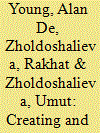

|
|
|
|
|
| Publication |
2013.
|
| Summary/Abstract |
Formal schooling was virtually non-existent before the Soviet power in nomadic Kyrgyzstan, as communal life and learning was organized informally at the household and clan level. During the Soviet period, however, educational success became an avenue to a new form of upward social and geographical mobility, and the school provided new and prestigious positions for local teachers and administrators. This paper explores how the externally imposed Soviet collectivization policies reshaped the understandings and meanings of place and community during the twentieth century, a reshaping that centrally involved redefining education and the importance of 'the school'. In the post-Soviet period, the utility of secondary and higher education in local and national labour markets has diminished, as has the power and prestige of educators. Yet the appeal of education lingers on. The authors seek to document these claims using oral histories, ethnographic interviews and participant observations in the Ylay Talaa Valley of the Kyrgyz Republic.
|
|
|
|
|
|
|
|
|
|
|
|
|
|
|
|
| 2 |
ID:
120728
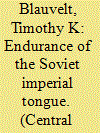

|
|
|
|
|
| Publication |
2013.
|
| Summary/Abstract |
This article will examine the role of the Russian language on the periphery of the post-Soviet space by using multiple sources of data, including original matched-guise experiments, to examine the language situation in contemporary Georgia. This is one of the former Soviet republics in which the use of the titular language was most intensively institutionalized and that most ardently resisted Russification, and one that today for various reasons is most eager to escape the legacy of its Soviet past and to embed itself in the global community. In Georgia the cultural and political influence of the former imperial centre has been greatly reduced, and Russian has been challenged in functional roles by the new international lingua franca of English. The direction that the Russian language takes in a place like Georgia may be a useful bellwether for such transformations elsewhere in the post-Soviet periphery.
|
|
|
|
|
|
|
|
|
|
|
|
|
|
|
|
| 3 |
ID:
120723
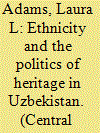

|
|
|
|
|
| Publication |
2013.
|
| Summary/Abstract |
The UNESCO office in Uzbekistan has been relatively successful in nominating cultural practices to The Representative List of the Intangible Cultural Heritage of Humanity. Selection for the List conveys prestige and draws international attention to local culture that is deemed of universal value. What is striking about the first successful nominations from Uzbekistan is that they point to the inseparability of Tajik and Uzbek culture, a touchy subject for both Uzbekistan and Tajikistan. In this article the author looks at how the politics of ethnic cultural heritage play out through these projects, highlighting the tensions between a rhetoric of diversity promoted both by UNESCO and by the official national ideology, and practices that demonstrate a more mundane, ethnically exclusive sense of national culture. Although ostensibly celebrating the rich diversity of Uzbekistan's national culture and eschewing the strict delineation of Tajik culture from Uzbek culture, the effect of UNESCO Intangible Cultural Heritage programmes is to perpetuate the occlusion of Tajik culture in Uzbekistan.
|
|
|
|
|
|
|
|
|
|
|
|
|
|
|
|
| 4 |
ID:
120724


|
|
|
|
|
| Publication |
2013.
|
| Summary/Abstract |
In a world still dominated by a geopolitical system of territorial states, one tool in the state- and nation-building repertoire is the strategy of moving a capital from one city to another, and to an ostensibly more 'central' location of a geometrically conceived territory. From Ankara to Brasília, the technique has been used in a variety of places around the world, and Kazakhstan's new capital since 1997, Astana, is one more recent iteration. Taking a Foucauldian approach to analysing political technologies of government, the author examines the strategy of the centrally located city and considers how it has been instrumental to simultaneously producing a 'state effect' and a 'territory effect' in newly independent Kazakhstan. Part of a larger mixed-methods study, this article draws on a diverse range of methods, including data from interviews, participant observation, textual analysis, focus groups and a country-wide survey.
|
|
|
|
|
|
|
|
|
|
|
|
|
|
|
|
| 5 |
ID:
120729
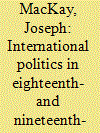

|
|
|
|
|
| Publication |
2013.
|
| Summary/Abstract |
Using historical analysis of relations between city-states and other international actors in Central Asia during the eighteenth and nineteenth centuries, this article evaluates new structural theories of international politics, chiefly those of David Lake and Jack Donnelly. Pre-colonial Central Asia offers a usefully tough case for structural theories, since it so little resembles the modern international order that these theories were developed to describe. Empirically, the article proceeds by evaluating the region's city-states' relations with three groups of actors: one another; neighbouring empires; and the many non-state actors present at the time. It concludes with an assessment of the merits of the new structuralisms, and a discussion of their value for constructivist international-relations theories of international change.
|
|
|
|
|
|
|
|
|
|
|
|
|
|
|
|
| 6 |
ID:
120725


|
|
|
|
|
| Publication |
2013.
|
| Summary/Abstract |
As Muslim communities reassert themselves in public life across the world, including Central Asia, their actions are causing tension in relations with 'secular' governments. Various global theories have been offered to explain these dynamics. According to one theory, tension between religious communities and secular states is caused by the exclusion or marginalization of Muslims, a process exacerbated by the perceived anti-Muslim bias in the foreign- and domestic-security policies of Central Asian states. A second view is that tension results from the work of global extremist groups espousing the restoration of an Islamic Caliphate. The third approach presents the rising tension as part of a broader trend: a putative clash of Western and Muslim civilizations. This article challenges these theories by using a case study of a Muslim grassroots protest in Kyrgyzstan to highlight the importance of local politics, namely informal arrangements among local officials, power brokers and community members. In so doing, it seeks to make a contribution to theorizing Muslim-state relations in Central Asia.
|
|
|
|
|
|
|
|
|
|
|
|
|
|
|
|
| 7 |
ID:
120727
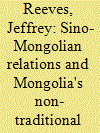

|
|
|
|
|
| Publication |
2013.
|
| Summary/Abstract |
The following article examines the effect China has on Mongolia's non-traditional security. Using the Copenhagen School's approach to non-traditional security, the article argues that Mongolia's economic dependence on China coupled with weak political security have allowed China to develop structural power over Mongolia's domestic institutions. This structural power also negatively affects Mongolia's societal and environmental security. Chinese structural power, therefore, has a net negative effect on Mongolia's domestic non-traditional security, despite Chinese policies that seek to maintain good relations with Mongolia. This suggests that China is not in complete control of its relations with Mongolia and that its use of economic ties to drive relations with Mongolia contains elements that ultimately undermine its position and Mongolia's security.
|
|
|
|
|
|
|
|
|
|
|
|
|
|
|
|
|
|
|
|
|